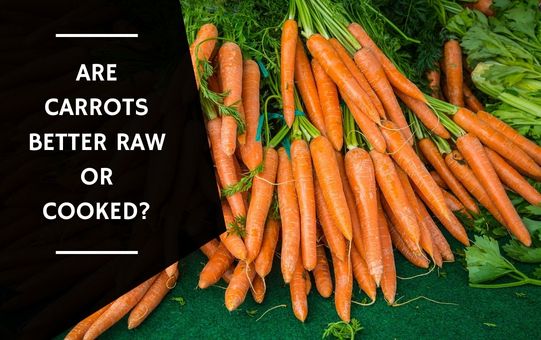Are raw carrots your preference, or do you prefer them cooked? Are carrots better raw or cooked? Raw carrots or cooked carrots? It is a common argument among carrot enthusiasts.
It is a matter of preference, but both raw and cooked carrots are healthy. Carrots are crunchy and retain all of their nutrients when they are raw, whereas cooked carrots may be sweeter and easier to chew. Both foods are nutritious additions to a healthy diet.
Both raw and cooked carrots offer health benefits, so let’s examine the advantages and disadvantages of each preparation.
Contents
Why are carrots better raw or cooked matter?
Whether carrots are better raw or cooked ultimately depends on personal preference and dietary needs. Raw carrots offer a crunchy texture and retain all of their nutrients, as cooking can sometimes cause vegetables to lose some of their nutritional value.
Raw carrots are also low in calories and can be a convenient snack option. On the other hand, cooked carrots may be sweeter and easier to chew, and can be prepared in a variety of ways to add flavor and variety to your meals.
They can also be a good option for those who have difficulty chewing raw carrots due to dental issues or age.
It’s important to note that the way in which you cook your carrots can also impact their nutritional value. Boiling or frying carrots can cause them to lose some of their nutrients while steaming or roasting can help to preserve them.
Therefore, it’s important to consider your cooking method when deciding whether to eat your carrots raw or cooked.
Read Also: Are Carrot Stems Edible?
Nutritional Value of Raw Carrots
Raw carrots are an excellent source of nutrients, including vitamin A, vitamin C, potassium, and fiber.
Vitamin A is important for maintaining healthy vision and supporting the immune system, while vitamin C is a powerful antioxidant that helps to protect the body from damage caused by free radicals.
Potassium is essential for maintaining proper heart function, and fiber helps to support digestive health.
One of the main benefits of eating raw carrots is that they retain all of their nutrients, as cooking can often cause vegetables to lose some of their nutritional value.
Raw carrots are also low in calories, making them a great snack option for those looking to watch their weight.

Pros of Eating Raw Carrots
In addition to their nutritional value, there are several other benefits to eating raw carrots:
- Convenience: Raw carrots are quick and easy to prepare – all you need to do is wash and chop them. They are also portable, making them a great snack to take on the go.
- Crunchy texture: Many people enjoy the crunchy texture of raw carrots, which can add some variety and texture to a meal.
- Versatility: Raw carrots can be eaten on their own as a snack, or they can be added to salads, dips, or other dishes.
Cons of Eating Raw Carrots
While there are many benefits to eating raw carrots, there are also a few drawbacks to consider:
- Tough to chew: Raw carrots can be tough to chew, especially for those with dental issues or who have difficulty chewing due to age.
- May cause digestive issues: Some people may experience digestive issues when eating raw carrots, as they can be difficult to digest due to their high fiber content.
- May not be as sweet: Raw carrots may not be as sweet as cooked carrots, depending on the variety and the growing conditions.
Nutritional Value of Cooked Carrots
Cooked carrots can also be a nutritious addition to your diet, as they still retain many of their nutrients even after cooking.
However, it is important to note that the way in which you cook your carrots can impact their nutritional value.
For example, boiling carrots can cause them to lose some of their nutrients, as they leach into the cooking water. On the other hand, steaming or roasting carrots can help to preserve their nutrients.
Pros of Eating Cooked Carrots
There are several benefits to eating cooked carrots:
- Easier to chew: Cooked carrots are softer and easier to chew, making them more suitable for those with dental issues or who have difficulty chewing.
- May be sweeter: Cooked carrots may be sweeter than raw carrots, as the heat of cooking can bring out their natural sugars.
- Versatility: Cooked carrots can be prepared in a variety of ways, including boiling, steaming, roasting, grilling, or sautéing. This means that you can enjoy them in a wide range of dishes and flavor profiles.
Cons of Eating Cooked Carrots
While there are many benefits to eating cooked carrots, there are also a few drawbacks to consider:
- May lose some nutrients: As mentioned previously, the way in which you cook your carrots can impact their nutritional value. Boiling or frying carrots can cause them to lose some of their nutrients while steaming or roasting can help to preserve them.
- May be higher in calories: Depending on how you prepare your cooked carrots, they may be higher in calories than raw carrots. For example, if you roast carrots with oil or butter, or add them to a dish with a high-fat sauce, they will be higher in calories than if you were to eat them raw.
- May not have the same crunchy texture: Cooked carrots may not have the same crunchy texture as raw carrots, which may be a drawback for some people.
Which is Better: Raw or Cooked Carrots?
So, which is better – raw or cooked carrots? The answer ultimately depends on your personal preference and dietary needs. If you are looking for a crunchy snack with a fresh, sweet taste and high nutritional value, then raw carrots may be the better choice for you.
On the other hand, if you have difficulty chewing or prefer a softer texture, or if you want to incorporate carrots into a wider range of dishes, then cooked carrots may be a better option.
Ultimately, the most important thing is to include carrots – whether raw or cooked – in your diet on a regular basis. Carrots are a nutritious and delicious addition to any meal, and they offer a wide range of health benefits.
So, whether you prefer them raw or cooked, be sure to enjoy them as part of a healthy and well-balanced diet.
Read Also: Are Carrot Skins Good For You?
FAQs | Raw or Cooked Carrots
Following are the FAQs related to raw or cooked carrots:
What Are The Benefits Of Eating Raw Carrots?
Raw carrots offer a crunchy texture and a fresh, sweet taste. They are also an excellent source of nutrients, including vitamin A, vitamin C, potassium, and fiber.
Raw carrots retain all of their nutrients, as cooking can sometimes cause vegetables to lose some of their nutritional value.
What Are The Benefits Of Eating Cooked Carrots?
Cooked carrots may be softer and sweeter than raw carrots, and can be prepared in a variety of ways to add flavor and variety to your meals.
They may also be easier to chew, which can be beneficial for those with dental issues or difficulty chewing due to age.
Can Raw Carrots Cause Digestive Issues?
Some people may experience digestive issues when eating raw carrots, as they can be difficult to digest due to their high fiber content.
If you are prone to digestive issues, you may want to consider cooking your carrots to make them easier to digest.
Do Cook Carrots Lose Their Nutrients?
The way in which you cook your carrots can impact their nutritional value. Boiling or frying carrots can cause them to lose some of their nutrients while steaming or roasting can help to preserve them.
It’s important to consider your cooking method when deciding whether to eat your carrots raw or cooked.
Are Cooked Carrots Higher In Calories Than Raw Carrots?
Cooked carrots may be higher in calories than raw carrots, depending on how they are prepared. For example, if you roast carrots with oil or butter, or add them to a dish with a high-fat sauce, they will be higher in calories than if you were to eat them raw. It’s important to consider the calorie content of your cooked carrots if you are watching your weight.

